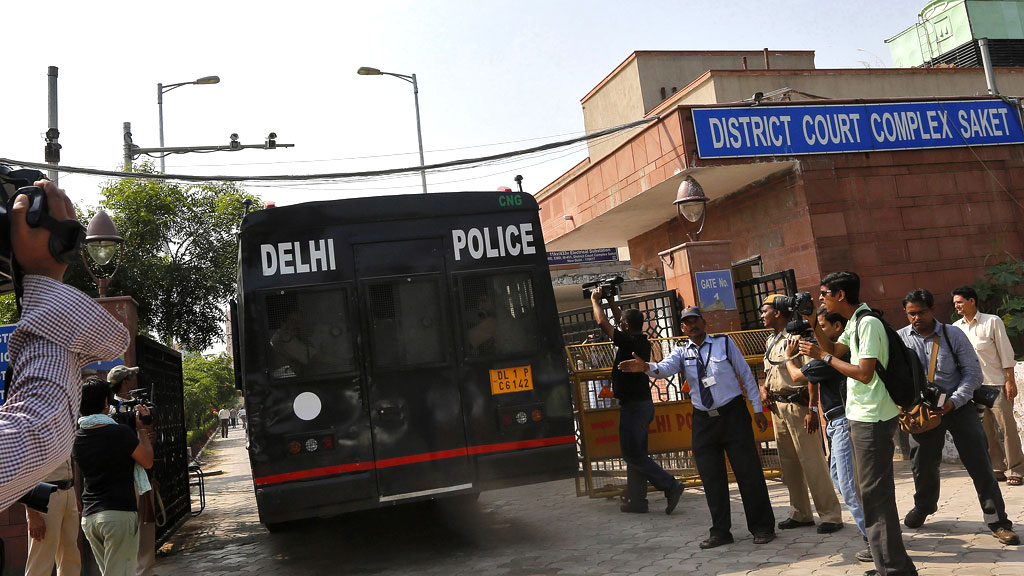Delhi rape death sentences: ‘Our girl has got justice’
Four men convicted of the gang-rape and murder of a young woman in Delhi last year have been sentenced to death. “Our girl has got justice,” said the victim’s father.

The brutal rape and killing of a 23-year-old New Delhi woman sent shockwaves throughout India, sparking massive protests and government pledges to reform laws on sexual violence.
The court was under intense pressure to deliver a harsh punishment, and Judge Yogesh Khanna made clear the resonance of the crime and its punishment, saying the attack “shocked the collective conscience” of India.
“In these times, when crime against women is on the rise, the courts cannot turn a blind eye toward such gruesome crimes,” he added.
I am very happy our girl has got justice. Victim’s father
The four men – fruit seller Pawan Gupta, bus cleaner Akshay Kumar Singh, gym instructor Vinay Sharma and unemployed Mukesh Singh – will be killed by hanging having been found guilty earlier this week. Mr Sharma broke down in tears in the courtroom after the verdict was read.
But the sentence will need to be confirmed by India’s high court: the men can appeal the sentence, and ask India’s president for clemency.
The verdict was greeted with cries of “Justice! Justice!” in the court room and ended a seven-month trial that was often held behind closed doors.
Scales of justice
The victim’s family, along with politicians and government officials, had called for the men to be executed. “I am very happy our girl has got justice,” said the victim’s father. He cannot be named under Indian laws guarding the deceased rape victim’s identity.
But the defence lawyer acting for two of the convicted men, AP Singh, said the sentence were politically motivated: “This is not the victory of truth. But it is the defeat of justice.”
The judge also ordered that the four men pay a total of 55,000 rupees (£548) to the 23-year-old victim’s family and issued fines to the Indian Police Service for their handling of the case.
While the widespread anger over this case is understandable, authorities must avoid using the death penalty as a ‘quick-fix’ solution – Amnesty International
Protests erupted across India in December last year following the brutal attack on a moving bus. Amongst the demands of protesters was harsher treatment for sexual violence.
The court had heard how the gang of men had lured the 23-year-old medical student and her male friend onto a bus. She was then repeatedly raped and penetrated with an iron rod, and the pair were savagely beaten and left at the side of the road. The woman died two weeks later in hospital from her injuries.
Another member of the gang, who was 17 at the time of the attack, was tried as a minor and has already been given the maximum sentence – three years in a reform home. A sixth member of the gang was found dead in his jail cell in March.
Death sentence
Many protesters had called for the death penalty, including members of the Congress-led national government who are now keen to be seen to have a tough line on sexual violence, especially ahead of elections next year.
But human rights groups issued concerns. Tara Rao, director of Amnesty International India said: “Sending these four men to the gallows will accomplish nothing except short-term revenge. While the widespread anger over this case is understandable, authorities must avoid using the death penalty as a ‘quick-fix’ solution.”
And although the government and police have tried to bring in reforms so that reports of sexual violence are better dealt with in the criminal justice system, many fear there is still a long way to go in a country where rape is often blamed on the victim, rather than the perpetrator.
India’s supreme court permits the death penalty in “the rarest of rare cases” and only two people – convicted terrorists – have been executed in the country since 2004.
In an attempt to highlight the flaws in the judicial sentence, defence lawyer Mr Sing said he may decide not to appeal if the sentence proves to be a deterrent, and if no rape cases are reported in India within the next two months (see video above).
“If any case of rape will not be registered in Delhi and all over India, then I will not go to the honourable High Court,” he said.
-
Latest news
-
‘We’re still a long way from justice’, says infected blood scandal victim5m

-
Infected blood scandal: Victims set to receive billions of government compensation7m

-
Iran’s president and foreign minister missing after helicopter crash3m

-
Yungblud launches his own affordable music festival5m

-
Why these Americans want to quit their state9m

-




